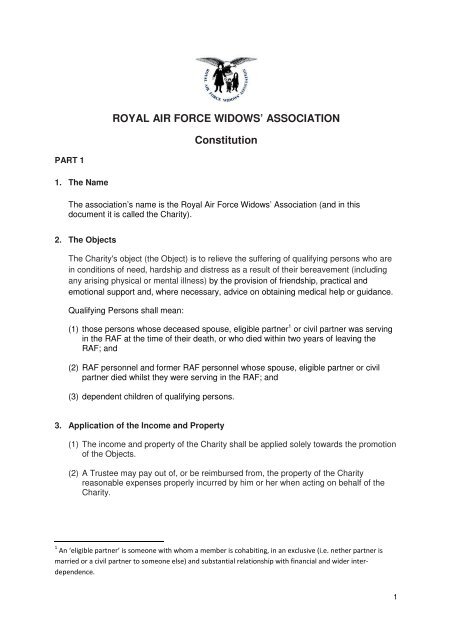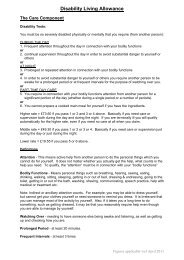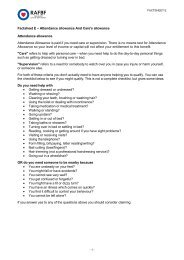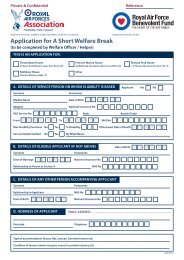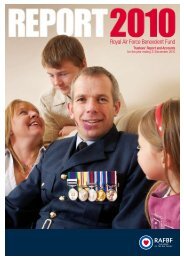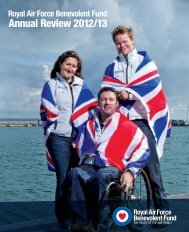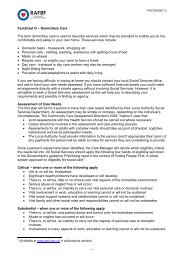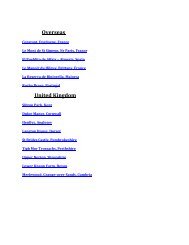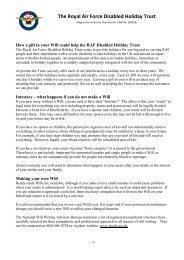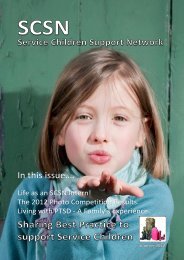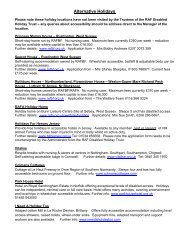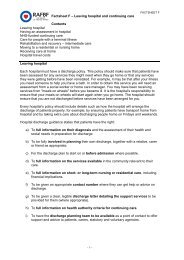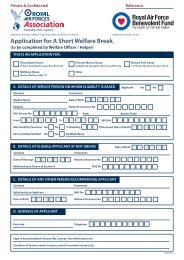constitution (PDF 98KB) - RAF Benevolent Fund
constitution (PDF 98KB) - RAF Benevolent Fund
constitution (PDF 98KB) - RAF Benevolent Fund
You also want an ePaper? Increase the reach of your titles
YUMPU automatically turns print PDFs into web optimized ePapers that Google loves.
ROYAL AIR FORCE WIDOWS’ ASSOCIATION<br />
Constitution<br />
PART 1<br />
1. The Name<br />
The association’s name is the Royal Air Force Widows’ Association (and in this<br />
document it is called the Charity).<br />
2. The Objects<br />
The Charity's object (the Object) is to relieve the suffering of qualifying persons who are<br />
in conditions of need, hardship and distress as a result of their bereavement (including<br />
any arising physical or mental illness) by the provision of friendship, practical and<br />
emotional support and, where necessary, advice on obtaining medical help or guidance.<br />
Qualifying Persons shall mean:<br />
(1) those persons whose deceased spouse, eligible partner 1 or civil partner was serving<br />
in the <strong>RAF</strong> at the time of their death, or who died within two years of leaving the<br />
<strong>RAF</strong>; and<br />
(2) <strong>RAF</strong> personnel and former <strong>RAF</strong> personnel whose spouse, eligible partner or civil<br />
partner died whilst they were serving in the <strong>RAF</strong>; and<br />
(3) dependent children of qualifying persons.<br />
3. Application of the Income and Property<br />
(1) The income and property of the Charity shall be applied solely towards the promotion<br />
of the Objects.<br />
(2) A Trustee may pay out of, or be reimbursed from, the property of the Charity<br />
reasonable expenses properly incurred by him or her when acting on behalf of the<br />
Charity.<br />
1 An ‘eligible partner’ is someone with whom a member is cohabiting, in an exclusive (i.e. nether partner is<br />
married or a civil partner to someone else) and substantial relationship with financial and wider interdependence.<br />
1
(3) None of the income or property of the Charity may be paid or transferred directly or<br />
indirectly by way of dividend bonus or otherwise by way of profit to any member of<br />
the Charity. This does not prevent:<br />
(a) a member who is not also a Trustee from receiving reasonable and proper<br />
remuneration for any goods or services supplied to the Charity;<br />
(b) a Trustee from:<br />
(i) buying goods or services from the Charity upon the same terms as other<br />
members or members of the public;<br />
(ii) receiving a benefit from the Charity in the capacity of a beneficiary of the<br />
Charity, provided that the Trustees comply with the provisions of sub clause<br />
(6) of this clause, or as a member of the Charity and upon the same terms as<br />
other members;<br />
(c) the purchase of indemnity insurance for the Trustees against any liability that by<br />
virtue of any rule of law would otherwise attach to a Trustee or other officer in<br />
respect of any negligence, default breach of duty or breach of trust of which he or<br />
she may be guilty in relation to the Charity but excluding:<br />
(i) fines;<br />
(ii) costs of unsuccessfully defending criminal prosecutions for offences arising<br />
out of the fraud, dishonesty or wilful or reckless misconduct of the Trustee or<br />
other officer;<br />
(iii) liabilities to the Charity that result from conduct that the Trustee or other<br />
officer knew or ought to have known was not in the best interests of the<br />
Charity or in respect of which the person concerned did not care whether that<br />
conduct was in the best interests of the Charity or not.<br />
(4) No Trustee may be paid or receive any other benefit for being a Trustee.<br />
(5) A Trustee may:<br />
(a) sell goods, services or any interest in land to the Charity;<br />
(b) be employed by or receive any remuneration from the Charity;<br />
(c) receive any other financial benefit from the Charity,<br />
if:<br />
(d) he or she is not prevented from so doing by sub-clause (4) of this clause; and<br />
(e) the benefit is permitted by sub-clause (3) of this clause; or<br />
(f) the benefit is authorised by the Trustees in accordance with the conditions in<br />
sub-clause (6) of this clause.<br />
(6) (a) If it is proposed that a Trustee should receive a benefit from the Charity that is not<br />
already permitted under sub-clause (3) of this clause, he or she must:<br />
(i) declare his or her interest in the proposal;<br />
2
(ii) be absent from that part of any meeting at which the proposal is discussed<br />
and take no part in any discussion of it;<br />
(iii) not be counted in determining whether the meeting is quorate;<br />
(iv) not vote on the proposal.<br />
(b) In cases covered by sub-clause (5) of this clause, those Trustees who do not<br />
stand to receive the proposed benefit must be satisfied that it is in the interests of<br />
the Charity to contract with or employ that Trustee rather than with someone who<br />
is not a Trustee and they must record the reason for their decision in the minutes.<br />
In reaching that decision the Trustees must balance the advantage of contracting<br />
with or employing a Trustee against the disadvantage of doing so (especially the<br />
loss of the Trustee’s services as a result of dealing with the Trustee’s conflict of<br />
interest).<br />
(c) The Trustees may only authorise a transaction falling within paragraphs 5(a)–(c)<br />
of this clause if the Trustee body comprises a majority of Trustees who have not<br />
received any such benefit.<br />
(d) If the Trustees fail to follow this procedure, the resolution to confer a benefit upon<br />
the Trustee will be void and the Trustee must repay to the Charity the value of<br />
any benefit received by the Trustee from the Charity.<br />
(7) A Trustee must absent himself or herself from any discussions of the Trustees in<br />
which it is possible that a conflict will arise between his or her duty to act solely in the<br />
interests of the Charity and any personal interest (including but not limited to any<br />
personal financial interest) and take no part in the voting upon the matter.<br />
(8) In this Clause 4, “Trustee” shall include any person firm or company connected with<br />
the Trustee.<br />
4. Dissolution<br />
(1) If the members resolve to dissolve the Charity the Trustees will remain in office as<br />
Charity Trustees and be responsible for winding up the affairs of the Charity in<br />
accordance with this clause.<br />
(2) The Trustees must collect in all the assets of the Charity and must pay or make<br />
provision for all the liabilities of the Charity.<br />
(3) The Trustees must apply any remaining property or money:<br />
(a) directly for the Objects;<br />
(b) by transfer to any Charity or charities for purposes the same as or similar to the<br />
Charity<br />
(c) in such other manner as the Charity Commission for England and Wales (“the<br />
Commission”) may approve in writing in advance.<br />
(4) The members may pass a resolution before or at the same time as the resolution to<br />
dissolve the Charity specifying the manner in which the Trustees are to apply the<br />
3
emaining property or assets of the Charity and the Trustees must comply with the<br />
resolution if it is consistent with paragraphs (a)–(c) inclusive in sub-clause (3) above.<br />
(5) In no circumstances shall the net assets of the Charity be paid to or distributed<br />
among the members of the Charity.<br />
(6) The Trustees must notify the Commission promptly that the Charity has been<br />
dissolved. If the Trustees are obliged to send the Charity’s accounts to the<br />
Commission for the accounting period which ended before its dissolution, they must<br />
send the Commission the Charity’s final accounts.<br />
5. Amendments<br />
(1) The Charity may amend any provision contained in Part 1 of this Constitution<br />
provided that:<br />
(a) no amendment may be made that would have the effect of making the Charity<br />
cease to be a Charity at law;<br />
(b) no amendment may be made to alter the Objects if the change would not be<br />
within the reasonable contemplation of the members of or donors to the Charity;<br />
(c) no amendment may be made to clause 3 without the prior written consent of the<br />
Commission;<br />
(d) any resolution to amend a provision of Part 1 of this <strong>constitution</strong> is passed by not<br />
less than two thirds of the votes cast by members present and eligible to vote at a<br />
general meeting and votes cast by post or electronic means from members<br />
electing to vote and entitled to do so.<br />
(2) Any provision contained in Part 2 of this <strong>constitution</strong> may be amended, provided that<br />
any such amendment is made by resolution passed by not less than two thirds of the<br />
votes cast by members present and eligible to vote at a general meeting and votes<br />
cast by post or electronic means from members electing to vote and entitled to do so.<br />
(3) A copy of any resolution amending this <strong>constitution</strong> shall be sent to the Commission<br />
within twenty-one days of it being passed.<br />
PART 2<br />
6. Membership<br />
(1) There shall be three classes of membership, full membership (voting), associate<br />
membership (non-voting) and honorary membership (non-voting) and the following<br />
persons shall be eligible for membership of each class:<br />
(a) Full membership of the Charity shall be open to all persons whose deceased<br />
spouse, eligible partner or civil partner was serving in the Royal Air Force at<br />
time of death, such death having occurred within the period of ten years<br />
preceding the date of application for full membership;<br />
(b) Associate membership of the Charity shall be open to:<br />
4
(i) all persons whose deceased spouse, partner or civil partner had served in<br />
the Royal Air Force and whose death occurred within two years of that<br />
service or whilst in full time employment with the Royal Air Force, such death<br />
having occurred not more than eight years preceding the date of application<br />
for membership;<br />
(ii) all <strong>RAF</strong> personnel, or former <strong>RAF</strong> personnel, whose civilian spouse, partner<br />
or civil partner died whilst they were serving in the Royal Air Force, such<br />
death having occurred within the period of ten years preceding the date of<br />
application for membership;<br />
(c) Honorary membership of the Charity shall be open to individuals who are<br />
approved by the Trustees.<br />
(2) (a) The Trustees may only refuse an application for membership if, acting reasonably<br />
and properly, they consider it to be in the best interests of the Charity to refuse<br />
the application.<br />
(b) The Trustees must inform the applicant in writing of the reasons for the refusal<br />
within twenty-one days of the decision.<br />
(c) The Trustees must consider any written representations the applicant may make<br />
about the decision. The Trustees’ decision following any written representations<br />
must be notified to the applicant in writing but shall be final.<br />
(3) Membership is not transferable to anyone else.<br />
(4) The Trustees must keep a register of names and addresses of the members.<br />
7. Termination of Membership<br />
Membership is terminated if:<br />
(1) the member dies;<br />
(2) the member resigns by written notice to the Charity unless, after the resignation,<br />
there would be less than two members;<br />
(3) any sum due from the member to the Charity is not paid in full within six months of it<br />
falling due;<br />
(4) the member is removed from membership by a resolution of the Trustees that it is in<br />
the best interests of the Charity that his or her membership is terminated. A<br />
resolution to remove a member from membership may only be passed if:<br />
(a) the member has been given at least twenty-one days’ notice in writing of the<br />
meeting of the Trustees at which the resolution will be proposed and the reasons<br />
why it is to be proposed;<br />
(b) the member or, at the option of the member, the member’s representative (who<br />
need not be a member of the Charity) has been allowed to make representations<br />
to the meeting.<br />
5
8. General Meetings<br />
(1) Members are entitled to attend general meetings of the Charity in person.<br />
Notices<br />
(2) General meetings are called on at least 14 clear days’ written notice to the<br />
members. The notice must specify the date, time and place of the meeting and the<br />
general nature of the business to be transacted. If the meeting is to be an annual<br />
general meeting, the notice must say so.<br />
(3) A general meeting may be called by shorter notice, if it is so agreed by all the<br />
members entitled to attend and vote.<br />
(4) The notice must be given to all the members and to the Trustees.<br />
Quorum<br />
(5) No business shall be transacted at any general meeting unless a quorum is present.<br />
There is a quorum at a general meeting if the number of members personally<br />
present is at least 15 members entitled to vote upon the business to be conducted<br />
at the meeting.<br />
(6) If:<br />
(a) a quorum is not present within half an hour from the time appointed for the<br />
meeting;<br />
or<br />
(b) during a meeting a quorum ceases to be present,<br />
the meeting shall be adjourned to such time and place as the Trustees shall<br />
determine.<br />
(7) The Trustees must re-convene the meeting and must give at least seven clear days’<br />
notice of the re-convened meeting stating the date time and place of the meeting.<br />
(8) If no quorum is present at the re-convened meeting within 15 minutes of the time<br />
specified for the start of the meeting the members present at that time shall<br />
constitute the quorum for that meeting.<br />
Chair<br />
(9) General meetings shall be chaired by the person who has been elected as Chair of<br />
the Charity, unless<br />
(a) If there is no such person, or he or she is not present within fifteen minutes of<br />
the time appointed for the meeting, a Trustee nominated by the Trustees shall<br />
chair the meeting.<br />
(b) If there is only one Trustee present and willing to act, he or she shall chair the<br />
meeting.<br />
6
(c) If no Trustee is present and willing to chair the meeting within fifteen minutes<br />
after the time appointed for holding it, the members present and entitled to vote<br />
must choose one of their number to chair the meeting.<br />
Voting<br />
(10) Each member entitled to vote shall have one vote but if there is an equality of votes<br />
the person who is chairing the meeting shall have a casting vote in addition to any<br />
other vote he or she may have.<br />
(11) Except where otherwise provided by this Constitution, every issue at a general<br />
meeting is determined by a simple majority of votes cast by members present in<br />
person and entitled to vote and votes cast by post or electronic means from<br />
members entitled to vote and unable to attend.<br />
Annual General Meetings<br />
(12) An Annual General Meeting must be held in every year and not more than fifteen<br />
months may elapse between successive Annual General Meetings.<br />
(13) At an Annual General Meeting the members:<br />
(a) receive the accounts of the Charity for the previous financial year;<br />
(b) receive the report of the Trustees on the Charity’s activities since the previous<br />
Annual General Meeting;<br />
(c) accept the retirement of those Trustees who wish to retire or who are retiring by<br />
rotation<br />
(d) receive the results of the postal and electronic communication ballot conducted<br />
to elect Trustees to fill the vacancies<br />
(e) receive the results of the postal and electronic communication ballot conducted<br />
to appoint the Officers of the Charity<br />
(f) receive the results of postal and electronic communication ballots on other<br />
matters put before the members<br />
(g) appoint an auditor or independent examiner for the Charity where required;<br />
(h) may confer on any individual (with his or her consent) the honorary title of<br />
Patron, Life President, or President of the Charity; and<br />
(i) discuss and determine any issues of policy or deal with any other business put<br />
before them by the Trustees.<br />
Extraordinary General Meetings<br />
(14) All general meetings other than Annual General Meetings shall be called<br />
Extraordinary General Meetings.<br />
(15) An Extraordinary General Meeting may be called at any time by the Trustees and<br />
must called within 14 clear days’ after a written request to the Trustees from at least<br />
7
ten members or one tenth of the membership, whichever is the greater. The request<br />
must state the nature of the business that is to be discussed. If the Trustees fail to<br />
hold the meeting within twenty-eight days of the request, the members may proceed<br />
to call an Extraordinary General Meeting but in doing so they must comply with the<br />
provisions of this Constitution.<br />
Adjournments<br />
(16) The members present at a general meeting may resolve that the meeting shall be<br />
adjourned.<br />
(17) The person who is chairing the meeting must decide the date time and place at<br />
which meeting is to be re-convened unless those details are specified in the<br />
resolution.<br />
(18) No business shall be conducted at an adjourned meeting unless it could properly<br />
have been conducted at the meeting had the adjournment not taken place.<br />
(19) If a meeting is adjourned by a resolution of the members for more than seven days,<br />
at least seven clear days’ notice shall be given of the re-convened meeting stating<br />
the date time and place of the meeting.<br />
9. Officers and Trustees<br />
(1) The Charity and its property shall be managed and administered by a committee<br />
comprising the Officers and other members elected in accordance with this<br />
Constitution. The Officers and other members of the committee shall be the Trustees<br />
of the Charity and in this <strong>constitution</strong> are together called “the Trustees”.<br />
(2) The Trustees when complete consists of at least five and not more than nine<br />
individuals, all of whom must be members of the Charity and all but two of whom<br />
must be full members of the charity.<br />
(3) No one may be appointed a Trustee if he or she would be disqualified from acting<br />
under the provisions of Clause 12.<br />
(4) A Trustee may not appoint anyone to act on his or her behalf at meetings of the<br />
Trustees.<br />
(5) The Charity shall have the following Officers:<br />
(a) A chair<br />
(b) A secretary<br />
(c) A treasurer.<br />
10. The Appointment of Trustees<br />
(1) The Charity in general meeting shall elect the Officers and the other Trustees.<br />
Where there are more candidates than vacancies a postal ballet and electronic<br />
communication shall be conducted.<br />
(2) The Trustees may appoint any person who is willing and eligible to act as a Trustee<br />
to fill a casual vacancy or as an additional Trustee, but a co-opted Trustee holds<br />
8
office only until the next Annual General Meeting. Subject to sub-clause 5(b) of this<br />
clause, they may also appoint Trustees to act as officers.<br />
(3) Trustees are elected for a term of office ending at the third AGM after the AGM at<br />
which he or she was elected. On the expiration of that term, a trustee is eligible to<br />
stand for re-election for one further term ending at the third AGM after the AGM at<br />
which he was re-elected. On the expiration of two consecutive terms, the period<br />
between two consecutive AGMs must normally elapse before the member is eligible<br />
to stand for election again.<br />
(4) No-one may be elected a Trustee or an Officer at any annual general meeting unless<br />
prior to the meeting the Charity is given a notice that:<br />
(a) is signed by a member entitled to vote at the meeting;<br />
(b) states the member’s intention to propose the appointment of a person as a<br />
Trustee or as an officer;<br />
(c) is signed by the person who is to be proposed to show his or her willingness to<br />
be appointed.<br />
(5) (a) The appointment of a Trustee, whether by the Charity in general meeting or by<br />
the other Trustees, must not cause the number of Trustees to exceed any<br />
number fixed in accordance with this <strong>constitution</strong> as the maximum number of<br />
Trustees.<br />
(b) The Trustees may not appoint a person to be an Officer if a person has already<br />
been elected or appointed to that office and has not vacated the office.<br />
(6) Every Trustee after appointment or reappointment must sign a declaration of<br />
willingness to act as a charity trustee of the Charity before he or she may vote at any<br />
meeting of the Trustees.<br />
11. Powers of Trustees<br />
(1) The Trustees must manage the business of the Charity and have the following<br />
powers in order to further the Objects (but not for any other purpose):<br />
(a) to raise funds. In doing so, the Trustees must not undertake any substantial<br />
permanent trading activity and must comply with any relevant statutory<br />
regulations;<br />
(b) to buy, take on lease or in exchange, hire or otherwise acquire any property and<br />
to maintain and equip it for use;<br />
(c) to sell, lease or otherwise dispose of all or any part of the property belonging to<br />
the Charity. In exercising this power, the Trustees must comply as appropriate<br />
with sections 36 and 37 of the Charities Act 1993, as amended by the Charities<br />
Act 2006;<br />
(d) to borrow money and to charge the whole or any part of the property belonging to<br />
the Charity as security for repayment of the money borrowed. The Trustees must<br />
comply as appropriate with sections 38 and 39 of the Charities Act 1993, as<br />
amended by the Charities Act 2006, if they intend to mortgage land;<br />
9
(e) to co-operate with other charities, voluntary bodies and statutory authorities and<br />
to exchange information and advice with them;<br />
(f) to establish or support any charitable trusts, associations or institutions formed<br />
for any of the charitable purposes included in the Objects;<br />
(g) subject to the consent of the members by resolution, to acquire, merge with or<br />
enter into any partnership or joint venture arrangement with any other Charity<br />
formed for any of the Objects;<br />
(h) to set aside income as a reserve against future expenditure but only in<br />
accordance with a written policy about reserves;<br />
(j) to obtain and pay for such goods and services as are necessary for carrying out<br />
the work of the Charity;<br />
(k) to open and operate such bank and other accounts as the Trustees consider<br />
necessary and to invest funds and to delegate the management of funds in the<br />
same manner and subject to the same conditions as the Trustees of a trust are<br />
permitted to do by the Trustee Act 2000;<br />
(l) to make standing orders consistent with this Constitution to govern proceedings<br />
at general meetings;<br />
(m) to do all such other lawful things as are necessary for the achievement of the<br />
Objects.<br />
(2) No alteration of this <strong>constitution</strong> or any special resolution shall have retrospective<br />
effect to invalidate any prior act of the Trustees.<br />
(3) Any meeting of Trustees at which a quorum is present at the time the relevant<br />
decision is made may exercise all the powers exercisable by the Trustees.<br />
12. Disqualification and Removal of Trustees<br />
A Trustee shall cease to hold office if he or she:<br />
(1) is disqualified from acting as a charity trustee by virtue of section 72 of the Charities<br />
Act 1993 (or any statutory re-enactment or modification of that provision);<br />
(2) ceases to be a member of the Charity;<br />
(3) becomes incapable by reason of mental disorder, illness or injury of managing and<br />
administering his or her own affairs;<br />
(4) resigns as a Trustee by notice to the Charity (but only if at least two Trustees will<br />
remain in office when the notice of resignation is to take effect); or<br />
(5) is absent without the permission of the Trustees from all their meetings held within a<br />
period of six consecutive months and the Trustees resolve that his or her office be<br />
vacated.<br />
10
13. Proceedings of Trustees<br />
(1) The Trustees may regulate their proceedings as they think fit, subject to the<br />
provisions of this <strong>constitution</strong>.<br />
(2) Any Trustee may call a meeting of the Trustees.<br />
(3) The secretary must call a meeting of the Trustees if requested to do so by a Trustee.<br />
(4) Questions arising at a meeting must be decided by a majority of votes.<br />
(5) In the case of an equality of votes, the person who chairs the meeting shall have a<br />
second or casting vote.<br />
(6) No decision may be made by a meeting of the Trustees unless a quorum is present<br />
at the time the decision is purported to be made.<br />
(7) The quorum shall be three or the number nearest to one half of the total number of<br />
Trustees, whichever is the greater or such larger number as may be decided from<br />
time to time by the Trustees.<br />
(8) A Trustee shall not be counted in the quorum present when any decision is made<br />
about a matter upon which that Trustee is not entitled to vote.<br />
(9) If the number of Trustees is less than the number fixed as the quorum, the continuing<br />
Trustees or Trustee may act only for the purpose of filling vacancies or of calling a<br />
general meeting.<br />
(10)The person elected as the Chair shall chair meetings of the Trustees.<br />
(11)If the Chair is unwilling to preside or is not present within ten minutes after the time<br />
appointed for the meeting, the Trustees present may appoint one of their number to<br />
chair that meeting.<br />
(12)The person appointed to chair meetings of the Trustees shall have no functions or<br />
powers except those conferred by this <strong>constitution</strong> or delegated to him or her in<br />
writing by the Trustees.<br />
(13)Urgent matters requiring a decision before the next trustees’ meeting may be<br />
proposed as a written resolution by the Chair or any two Trustees. The Charity’s<br />
Secretary shall send a copy of the written resolution by post or electronic means to<br />
every Trustee and must specify the date by which a decision is to be returned. A<br />
written resolution shall be passed as if it were a decision taken in a meeting if at least<br />
three quarters of the Trustees signify their consent in writing, either by post or<br />
electronic means, by the due date. A Trustee’s agreement to a written resolution,<br />
once signified, cannot be revoked. Any duly adopted written resolution shall be<br />
recorded in the minutes of the following Trustees’ meeting.<br />
(14)The resolution in writing may comprise several documents containing the text of the<br />
resolution in like form each signed by one or more Trustees.<br />
11
14. Delegation<br />
(1) The Trustees may delegate any of their powers or functions to a committee of two or<br />
more Trustees but the terms of any such delegation must be recorded in the minute<br />
book.<br />
(2) The Trustees may impose conditions when delegating, including the conditions that:<br />
(a) the relevant powers are to be exercised exclusively by the committee to whom<br />
they delegate;<br />
(b) no expenditure may be incurred on behalf of the Charity except in accordance<br />
with a budget previously agreed with the Trustees.<br />
(3) The Trustees may revoke or alter a delegation.<br />
(4) All acts and proceedings of any committees must be fully and promptly reported to<br />
the Trustees.<br />
15. Advisory Council<br />
(1) There shall be an Advisory Council and the Trustees must meet with the Advisory<br />
Council at least once in each 12 month period.<br />
(2) The Advisory Council shall have the right to give advice and to make representations<br />
to the Trustees in respect of the charity’s strategy and policies. The Trustees shall<br />
take account of any such advice or representations but shall not be bound to follow<br />
such advice or representations.<br />
16. Irregularities in Proceedings<br />
(1) Subject to sub-clause (2) of this clause, all acts done by a meeting of Trustees, or of<br />
a committee of Trustees, shall be valid notwithstanding the participation in any vote<br />
of a Trustee:<br />
(a) who was disqualified from holding office;<br />
(b) who had previously retired or who had been obliged by the <strong>constitution</strong> to vacate<br />
office;<br />
(c) who was not entitled to vote on the matter, whether by reason of a conflict of<br />
interest or otherwise;<br />
if, without:<br />
(d) the vote of that Trustee; and<br />
(e) that Trustee being counted in the quorum,<br />
the decision has been made by a majority of the Trustees at a quorate meeting.<br />
(2) Sub-clause (1) of this clause does not permit a Trustee to keep any benefit that may<br />
be conferred upon him or her by a resolution of the Trustees or of a committee of<br />
Trustees if the resolution would otherwise have been void.<br />
(3) No resolution or act of<br />
12
17. Minutes<br />
(a) the Trustees<br />
(b) any committee of the Trustees<br />
(c) the Charity in general meeting<br />
shall be invalidated by reason of the failure to give notice to any Trustee or member<br />
or by reason of any procedural defect in the meeting unless it is shown that the<br />
failure or defect has materially prejudiced a member or the beneficiaries of the<br />
Charity.<br />
The Trustees must keep minutes of all:<br />
(1) appointments of Officers and Trustees made by the Trustees;<br />
(2) proceedings at meetings of the Charity;<br />
(3) meetings of the Trustees and committees of Trustees including:<br />
(a) the names of the Trustees present at the meeting;<br />
(b) the decisions made at the meetings; and<br />
(c) where appropriate the reasons for the decisions.<br />
18. Annual Report and Return and Accounts<br />
(1) The Trustees must comply with their obligations under the Charities Act 1993 with<br />
regard to:<br />
(a) the keeping of accounting records for the Charity;<br />
(b) the preparation of annual statements of account for the Charity;<br />
(c) the transmission of the statements of account to the Charity;<br />
(d) the preparation of an Annual Report and its transmission to the Commission;<br />
(e) the preparation of an Annual Return and its transmission to the Commission.<br />
(2) Accounts must be prepared in accordance with the provisions of any Statement of<br />
Recommended Practice issued by the Commission, unless the Trustees are required<br />
to prepare accounts in accordance with the provisions of such a Statement prepared<br />
by another body.<br />
19. Registered Particulars<br />
The Trustees must notify the Commission promptly of any changes to the Charity’s entry<br />
on the Central Register of Charities.<br />
20. Property<br />
(1) The Trustees must ensure the title to:<br />
13
(a) all land held by or in trust for the Charity that is not vested in the Official<br />
Custodian of Charities; and<br />
(b) all investments held by or on behalf of the Charity,<br />
is vested either in a corporation entitled to act as custodian Trustee or in not less that<br />
three individuals appointed by them as holding Trustees.<br />
(2) The terms of the appointment of any holding Trustees must provide that they may act<br />
only in accordance with lawful directions of the Trustees and that if they do so they<br />
will not be liable for the acts and defaults of the Trustees or of the members of the<br />
Charity.<br />
(3) The Trustees may remove the holding Trustees at any time.<br />
21. Repair and Insurance<br />
The Trustees must keep in repair and insure to their full value against fire and other<br />
usual risks all the buildings of the Charity (except those buildings that are required to be<br />
kept in repair and insured by a tenant). They must also insure suitably in respect of<br />
public liability and employer’s liability.<br />
22. Notices<br />
(1) Any notice required by this <strong>constitution</strong> to be given to or by any person must be:<br />
(a) in writing; or<br />
(b) given using electronic communications.<br />
(2) The Charity may give any notice to a member either:<br />
(a) personally; or<br />
(b) by sending it by post in a prepaid envelope addressed to the member at his or<br />
her address; or<br />
(c) by leaving it at the address of the member; or<br />
(d) by giving it using electronic communications to the member’s address.<br />
(3) A member who does not register an address with the Charity or who registers only a<br />
postal address that is not within the United Kingdom shall not be entitled to receive<br />
any notice from the Charity.<br />
(4) A member present in person at any meeting of the Charity shall be deemed to have<br />
received notice of the meeting and of the purposes for which it was called.<br />
(5) (a) Proof that an envelope containing a notice was properly addressed, prepaid and<br />
posted shall be conclusive evidence that the notice was given.<br />
(b) Proof that a notice contained in an electronic communication was sent in<br />
accordance with guidance issued by the Institute of Chartered Secretaries and<br />
Administrators shall be conclusive evidence that the notice was given.<br />
14
(c) A notice shall be deemed to be given 48 hours after the envelope containing it<br />
was posted or, in the case of an electronic communication, 48 hours after it was<br />
sent.<br />
23. Rules<br />
(1) The Trustees may from time to time make rules or bye-laws for the conduct of their<br />
business.<br />
(2) The bye-laws may regulate the following matters but are not restricted to them:<br />
a) the admission of members of the Charity and the rights and privileges of such<br />
members, and the entrance fees, subscriptions and other fees or payments to be<br />
made by members;<br />
b) the conduct of members of the Charity in relation to one another, and to the<br />
Charity’s employees and volunteers;<br />
c) the setting aside of the whole or any part or parts of the Charity’s premises at any<br />
particular time or times or for any particular purpose or purposes;<br />
d) the procedure at general meeting and meetings of the Trustees in so far as such<br />
procedure is not regulated by this Constitution;<br />
e) the keeping and authenticating of records. (If regulations made under this clause<br />
permit records of the Charity to be kept in electronic form and requires a Trustee<br />
to sign the record, the regulations must specify a method of recording the<br />
signature that enables it to be properly authenticated.)<br />
f) the procedures for the appointments of Patrons, Presidents, Advisors and other<br />
honorary positions;<br />
g) the procedures for the appointment of members of the Advisory Council and for<br />
meetings of the Advisory Council;<br />
h) generally, all such matters as are commonly the subject matter of the rules of an<br />
unincorporated association.<br />
(3) The Charity in general meeting has the power to alter, add to or repeal the rules or<br />
bye-laws.<br />
(4) The Trustees must adopt such means as they think sufficient to bring the rules and<br />
bye-laws to the notice of members of the Charity.<br />
(6) The rules or bye-laws shall be binding on all members of the Charity. No rule or byelaw<br />
shall be inconsistent with, or shall affect or repeal anything contained in, this<br />
Constitution.<br />
24. Interpretation<br />
(1) In this Constitution:<br />
(a) ‘the Charity’ means the charity comprised in this Constitution;<br />
15
(b) ‘charity trustees’ has the meaning prescribed by section 97(1) of the Charities Act<br />
1993;<br />
(c) ‘clear day’ means 24 hours from midnight following the relevant event;<br />
(d) ‘the Commission’ means the Charity Commission for England and Wales;<br />
(e) ‘financial year’ means the Charity’s financial year;<br />
(f) ‘firm’ includes a limited liability partnership;<br />
(g) ‘indemnity insurance’ means insurance against personal liability incurred by any<br />
Trustee for an act or omission which is or is alleged to be a breach of trust or<br />
breach of duty, unless the Trustee concerned knew that, or was reckless whether,<br />
the act or omission was a breach of trust or breach of duty;<br />
(h) ‘independent examiner’ has the meaning prescribed by section 43(3)(a) of the<br />
Charities Act 1993;<br />
(i) ‘material benefit’ means a benefit which may not be financial but has a monetary<br />
value;<br />
(j) ‘member’ and ‘membership’ refer to membership of the Charity<br />
(k) ‘months’ means calendar months;<br />
(l) ‘the Objects’ means the charitable objects of the Charity set out in clause 2;<br />
(m) ‘taxable trading’ means carrying on a trade or business on a continuing basis for<br />
the principal purpose of raising funds and not for the purpose of actually carrying<br />
out the Objects;<br />
(n) ‘the Trustee’ means a member of the governing body of the Charity and<br />
‘Trustees’ the members of the governing body;<br />
(o) ‘written’ or ‘in writing’ refers to a legible document on paper including a fax<br />
message;<br />
(p) ‘year’ means calendar year<br />
(2) References to an Act of Parliament are references to the Act as amended or reenacted<br />
from time to time and to any subordinate legislation made under it.<br />
16


